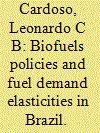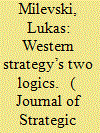| Srl | Item |
| 1 |
ID:
166352


|
|
|
|
|
| Summary/Abstract |
Biofuels are often seen by policymakers as solutions to concerns about the environment, energy diversification, and rural development. To understand the impacts of biofuel policy, however, it is important to understand demand elasticities. Brazil, a leader in biofuels, provides a unique setting to increase our knowledge about biofuel policy and the interactions within and between the gasoline and ethanol markets. We estimate own-price, cross-price, and income elasticities of the demand for ethanol and gasoline using a novel instrumental variable approach to control for the inherent endogeneity between supply and demand. This results in own-price elasticities for both fuels higher than previous literature suggests: approximately − 0.9 for gasoline and − 1.5 for ethanol. Income elasticities for both fuels are approximately 0.8. We also examine the elasticity impacts following the introduction of flex-fuel cars into the Brazilian market. By estimating the model with over 100 subsamples across time, we find that cross-price elasticities become positive, significant, and increasing, but only after larger market penetration of flex-fuel cars, which occurred approximately three years after their introduction.
|
|
|
|
|
|
|
|
|
|
|
|
|
|
|
|
| 2 |
ID:
189430


|
|
|
|
|
| Summary/Abstract |
Classical strategy as a concept encompasses two different logics (instrumentality and adversariality) as well as two different modes (decision-making and performance). In modern strategy, these modes have been on diverging paths, with varying interpretations privileging one logic above the other. Game theory focuses on decision-making, but encompasses both adversariality and instrumentality. Operational art focuses on performance, but in an adversarial context. The ends, ways, means model emphasises performance in an instrumental context. Each is imbalanced and inadequate when faced with the challenge of comprehending and controlling war. Strategic studies must make a return to balanced interpretations of strategy.
|
|
|
|
|
|
|
|
|
|
|
|
|
|
|
|